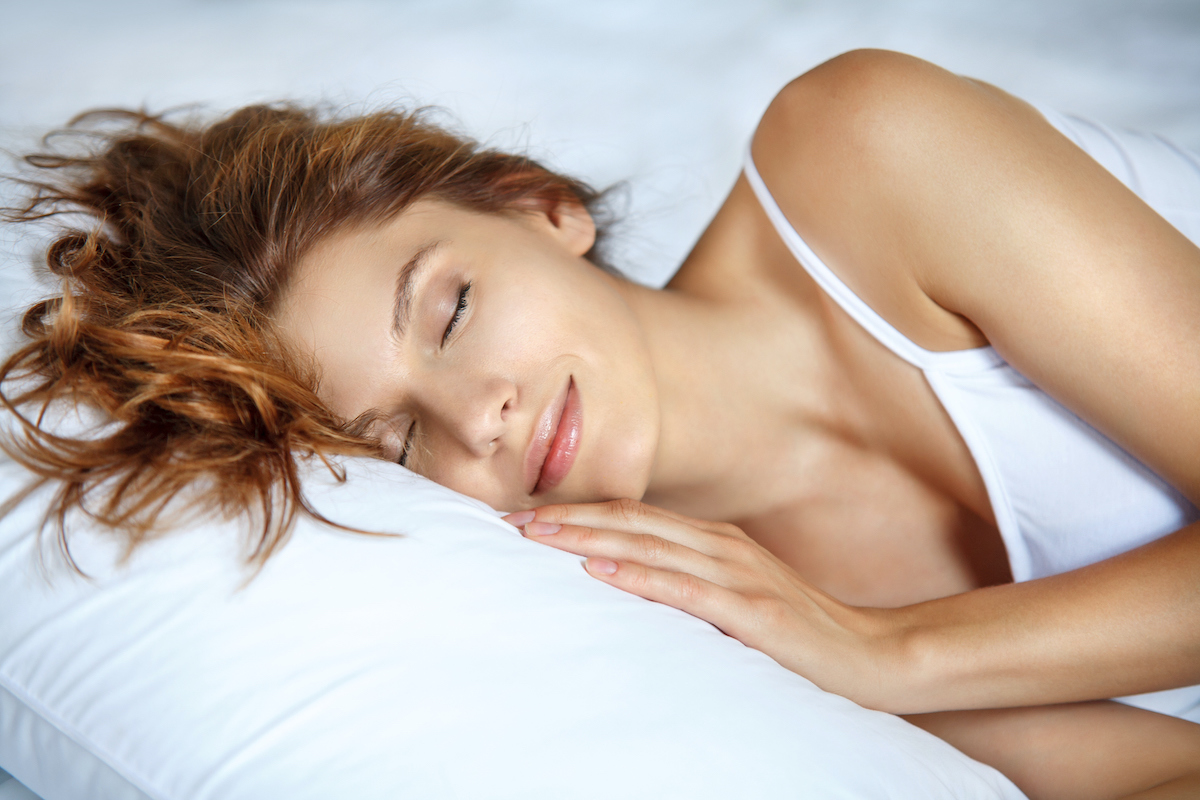Over the last few months, the media, doctors, and individuals have shared just about every immune-boosting supplement on the planet. While those different substances can be impactful, they fail to address one of the most significant underlying factors to immune strength: the quality and quantity of your sleep.
There are countless ways to support a strong immune system, but one of the most impactful (yet often overlooked) is a good night’s sleep. For those who reach for a bottle of melatonin every night, but still toss and turn or wake up feeling unrested, here are 4 natural ways to improve your sleep quality so you can support optimal immune function.
Why Is Good Sleep Necessary for a Strong Immune System?
I hate to break it to you, but your late-night Netflix binge is affecting more than just your work performance. Researchers have found that sleeping 6 hours or less makes you 4x more likely to catch a cold compared to those who sleep 7+ hours a night. Along with this, every hour of sleep lost continues to raise the risk of contracting an illness.
Although the immune system is working around the clock, sleep presents an opportunity for the immune system to work without the interruptions of eating, moving, or critical thinking tasks. Getting enough quality and quantity of sleep allows the immune system to fight at full force for as long as possible.
This is accomplished through a variety of immune cells, two of which include T-cells and cytokines. T-cells are the fighter cells that respond to pathogens, they utilize sticky proteins called integrins to attach to pathogenic cells and destroy them. Studies have found that individuals who sleep more have higher levels of integrin activation compared to individuals who sleep less or who sleep poorly. So what does that mean? In essence, quality sleep means your T-cells can attach better and faster to pathogenic invaders like bacteria or viruses and destroy them.
Cytokines are another type of cell that act as messengers for the immune system, alerting the forces that pathogens are present and calling the troops to action. These proteins are critical to a swift and effective immune response. The catch? They are only produced and released during sleep.
4 Natural Ways to Improve Sleep and Boost Immunity
Ready to turn off the TV or put down the phone a little earlier tonight? For those convinced better sleep is critical to immune health, but have no idea how to actually achieve it, read on for 4 natural ways to improve your sleep quality.
20+ Minutes of Sun Exposure
Among other hormones, this early morning sun exposure triggers serotonin production. Not only is this the “happy hormone”, but it is also a precursor to melatonin production. In other words, if you do not have enough sun exposure in the morning and throughout the day, you won’t have optimal serotonin and therefore you won’t be able to produce as much melatonin to induce deep sleep (Sansone, 2015).
What To Do: Step outside for 3-5 minutes as soon as you wake up. For the early risers who are up before the sun, get outside as soon as it has risen. As your day continues, try to achieve at least 20 minutes of total sun exposure.
Reduce Bluelight After Sunset
Our brains are wired to produce certain hormones at certain times of the day depending on the light outside. When the sun sets, but we are still staring and cell phone screens, TV screens, and bright LED lights in the house, we are sending our body signals that it is still daytime. As a result, our body does not trigger the production of “sleepy” hormones like melatonin.
What to Do: For the beginner, purchase amber-tinted, blue light blocking glasses to wear after the sun has set. For those willing to dive a bit deeper, you could replace specific light bulbs in the house with red lights (red light does not inhibit melatonin production) and turn off bright LED lights, consider lighting the house with candles after dark and/or stopping all electronic use after sunset.
Stop Eating Three Hours Before Bed
The stomach takes roughly 3 hours to empty itself after a meal and guess what? Digestion requires a lot of energy to properly breakdown food, absorb nutrients, and neutralize toxins. Eating right before bed can cause indigestion, GERD, acid reflux, and more because the body is trying to shut down, but still has unprocessed foods in need of attention. As a result, food isn’t digested properly, and these gastrointestinal symptoms can, in turn, disrupt a deep sleep pattern.
What to Do: Stop eating three hours before bed. This by itself, can have a huge impact on the quality of your sleep. Of course, many individuals are not able to eat until late in the evening. If this is the case, eat a small and easy to digest meal (soups, cooked veggies, a smoothie). Cooked, hot foods are easier for the body to digest and can, therefore, be processed quicker.
Create a Dark Sleeping Environment
We have already discussed the fact that blue light reduces melatonin production because the body assumes that if blue light is present, it must be day time. Even once asleep, however, light in the bedroom can continue to disrupt proper hormone production. This leads to “tossing and turning” and waking up frequently throughout the night.
What to Do: If you live on a well-lit street, hang blackout curtains or at the very least close your blinds. Check your bedroom for any electronics that may emit light of any kind. If possible remove these electronics or cover the lit area with a cloth or black sticker. For example, my bedside humidifier has a small blue light that is lit when the system is on. I simply covered this light with a small black sticker and repeated this with any other electronics in my bedroom.
The steps above may seem drastic, but I promise, after a week or two of implementation you will be blown away at the improvement to your sleep quality. The best part about it (well other than great sleep)? No adverse side effects.
One of the many reasons I love natural hacks is that they are virtually risk-free to try. I’m not handing you a pill to try and saying, “Try this out for your sleep, and oh, by the way, it may also cause diarrhea, constipation dizziness, nauseous, etc, etc.”
I’m saying try these 4 natural ways to improve your sleep quality and, worst-case scenario, they do nothing, but best-case scenario, they change your life.
For more science-backed, holistic lifestyle articles by Leigh Ann Lindsey, visit my website and tune in to The Accrescent Podcast every Monday for expert interviews on integrative ways to achieve optimal health.











Join the GloWell Community on Social!
Don't risk missing a single thing. Follow us on social and become part of the GloWell community.